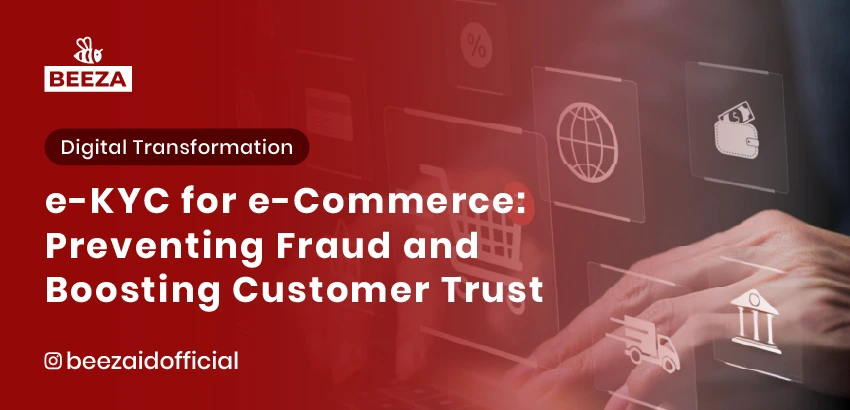
E-commerce is growing rapidly, with millions of transactions happening daily. However, this growth also brings major security challenges, such as identity fraud, fake accounts, payment fraud, and chargeback scams. These issues not only lead to financial losses but also damage customer trust in online platforms.
To combat these risks, electronic Know Your Customer (eKYC) has become a crucial tool for e-commerce businesses. eKYC enables platforms to verify customer identities digitally and accurately, ensuring secure transactions and preventing fraudulent activities.
In this article, we will explore the importance of eKYC in e-commerce, how it works, its key benefits, implementation challenges, and future trends.
What Is eKYC and How Does It Work?
eKYC (electronic Know Your Customer) is a digital identity verification process that allows businesses to confirm customer identities without physical documentation. It helps e-commerce platforms ensure that users registering or making transactions are legitimate.
How eKYC Works in E-Commerce
- User uploads identification documents (e.g., passport, ID card, driver’s license).
- Biometric verification (facial recognition or fingerprint scanning) matches user identity.
- Document authentication using AI and official databases to detect forgery.
- Approval and validation occur in real-time, ensuring instant and seamless verification.
With eKYC, the entire registration and transaction process becomes faster, more secure, and fraud-resistant.
Key Benefits of eKYC in E-Commerce
1. Preventing Identity Fraud and Fake Accounts
🔹 Challenge: Fraudsters often create fake accounts to commit scams, post fake reviews, or manipulate online marketplaces.
✅ Solution: eKYC ensures that only verified users can create accounts, preventing identity fraud and reducing fake activities on e-commerce platforms.
2. Reducing Chargeback Fraud
🔹 Challenge: Chargeback fraud happens when customers falsely dispute transactions to get refunds while keeping the purchased items, leading to financial losses for merchants.
✅ Solution: With eKYC, businesses can verify that the person making a transaction is the actual cardholder, reducing fraudulent chargeback claims.
3. Enhancing Customer Trust and Loyalty
🔹 Challenge: Many customers hesitate to shop online due to security concerns and the risk of fraud.
✅ Solution: By implementing eKYC, e-commerce platforms build trust and transparency, ensuring that both buyers and sellers are verified, making the platform safer for transactions.
4. Ensuring Compliance with Regulations
🔹 Challenge: Governments worldwide are implementing stricter regulations on digital security, including data protection laws and financial transaction compliance.
✅ Solution: eKYC helps e-commerce businesses stay compliant with regulatory requirements, avoiding legal risks and fines.
5. Improving Operational Efficiency and Reducing Costs
🔹 Challenge: Manual identity verification is time-consuming and costly, requiring human intervention.
✅ Solution: eKYC automates verification processes, reducing operational expenses and allowing businesses to onboard customers faster.
Challenges in Implementing eKYC and How to Overcome Them
1. High Implementation Costs
💡 Solution: Beeza provides cost-effective and scalable eKYC solutions, making it accessible for businesses of all sizes.
2. Data Privacy and Security Concerns
💡 Solution: Beeza’s eKYC system is built with advanced encryption and compliance standards, ensuring customer data is secure and protected.
3. Integration with Existing E-Commerce Platforms
💡 Solution: Beeza offers API-based integration, making it easy to connect eKYC with existing e-commerce systems without major infrastructure changes.
Future Trends in eKYC for E-Commerce
🚀 AI-Powered Fraud Detection – Machine learning will enhance eKYC accuracy, identifying suspicious activities instantly.
🚀 Facial Recognition for Secure Payments – Advanced biometric authentication will enable safer and faster transactions.
🚀 Blockchain for Data Security – Decentralized identity verification will reduce data breaches and fraud.
🚀 Multi-Factor Authentication (MFA) – Combining eKYC with biometrics and OTP (One-Time Passwords) for stronger security.
Conclusion
eKYC is the key to secure and trustworthy e-commerce transactions. By implementing eKYC, online businesses can prevent fraud, enhance customer trust, and streamline operations.
💡 Looking to integrate eKYC into your e-commerce platform?
Beeza provides secure, flexible, and AI-powered eKYC solutions. Contact us today for a free consultation! 📞 Get in touch with Beeza now!